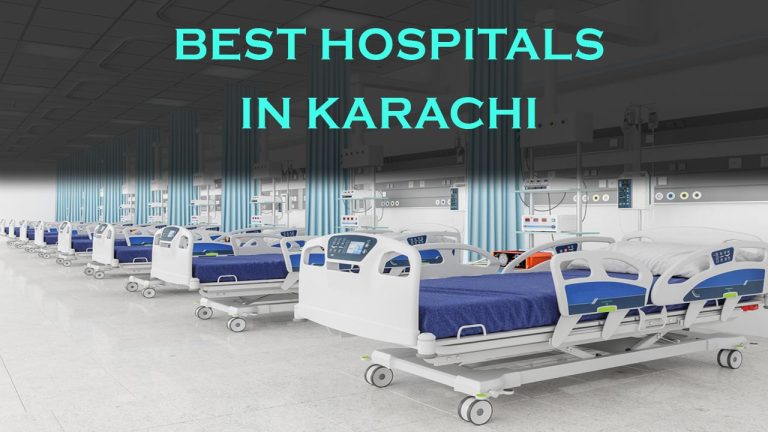Karachi, the capital of Pakistan is not only the financial place of the entire country but it also has one of the finest healthcare facilities of the country. The city is well equipped with medical facilities that satisfy the medical needs of both the local and international standards and have state-of-the art diagnostic suites to special treatment centers. Whether you require emergency room services, advanced surgery, or refer to a specific clinic or hospital such as a cardiology, oncology, or rehab, the finest hospitals in Karachi boast certified doctors, cutting edge technology and patient centered focus. We have listed the top 8 hospitals in Karachi based on the services they provide to their patients and family so that you can make the right decisions when it comes to choosing the best healthcare facility.
Aga Khan University Hospital (AKUH)
Established: 1985
Type: Private, Teaching & Research Hospital
Capacity: 560 beds (ICU, CCU, NICU, General Wards, Private Rooms)
Specialties: Cardiology, Surgery, Obstetrics & Gynecology, Pediatrics, Psychiatry, Day Care Surgeries, Diagnostic Services (Radiology, Nuclear Medicine, Laboratory, Neurophysiology).
Unique Strengths:
- Joint Commission International (JCI) accredited.
- Pakistan’s first hospital to introduce Neuro-Robotic Exoscope technology for brain surgery.
- Operates 47 laboratory collection centers nationwide.
- Modern private wing completed in 2020.
Architecture: Built on a 65-acre complex designed by Payette Associates (Boston, USA), featuring a medical school, nursing school, mosque, and residential facilities.
Impact: Known for shortest patient stay (avg. 4 days) in the region and strong partnerships with other Karachi hospitals under KMC for healthcare improvement.
Location: Aga Khan University Hospital (AKUH)
Jinnah Postgraduate Medical Centre (JPMC)
Established: 1948 (renamed in 1949 to honor Muhammad Ali Jinnah)
Type: Public, Teaching & General Hospital
Capacity: 2,208 beds
Location: Rafiqui Shaheed Road, Karachi Cantonment, Sindh
Specialties & Services:
- Major tertiary care center with emergency department
- Surgery, medicine, pediatrics, gynecology, cardiology, oncology, and trauma care
- Teaching and training facility for postgraduate medical education
Unique Strengths:
- One of the largest public hospitals in Karachi
- Treats over 1.8 million patients annually
- Provides free or subsidized healthcare to low-income populations
Impact: JPMC is a vital aspect of the healthcare sector in Karachi and becomes a lifesaver to millions of patients not able to afford the health care facility of the privatized sector. It has a long history and enormous patient capacity thus it is among the most reliable government hospitals of the country.
Location: Jinnah Postgraduate Medical Centre (JPMC)
Liaquat National Hospital (LNH)
Established: Foundation laid in 1953, inaugurated in 1958
Type: Private, Teaching & Research Hospital (non-profit)
Capacity: ~700 beds, 32 specialty services
Location: National Stadium Road, Karachi
History:
It was constructed by funds raised by Rana Liaquat Ali Khan with help of philanthropist Syed Wajid Ali and subsequently named after Liaquat Ali Khan, the first Prime Minister of Pakistan. It has expanded over the years to become a major postgraduate medical center bearing School of Nursing, School of Physiotherapy, College of Medical Laboratory Technology and various residency programs.
Specialties & Services:
- Medical & Allied: Cardiology, Chest Medicine, Dermatology, Endocrinology & Diabetes, Gastroenterology, General Medicine, Nephrology, Neurology, Oncology, Pediatrics, Psychiatry, Rheumatology
- Surgical & Allied: General Surgery, Orthopedics, Urology, Neurosurgery, Plastic Surgery, and more
- Diagnostics: Modern Radiology, Laboratory, Pathology, and Imaging facilities
- Other Services: Pharmacy, Physiotherapy & Rehabilitation
Unique Strengths:
- Recognized for fellowship by the College of Physicians & Surgeons Pakistan (CPSP)
- Several disciplines also recognized by the Royal Colleges in the UK
- Strong residency training programs across most specialties
Impact:
Liaquat National is the most well known of Karachi privately owned hospitals as it has more than 700 beds and a rich variety of specialties. It provides a balance between modern medical education and affordable patient care hence it is the center of attention in provision of healthcare as well as postgraduate medical training in Pakistan.
Location: Liaquat National Hospital (LNH)
Sindh Institute of Urology and Transplantation (SIUT)
Established: 1970s (officially developed into an institute in 1991)
Type: Public, Specialty Institute (Non-profit)
Capacity: 2000 beds (expanded over the years)
Location: Civil Hospital Karachi, near M.A. Jinnah Road
Specialties & Services:
- Renal Diseases, Dialysis & Kidney Transplantation
- Urology & Nephrology
- Liver Transplant & Hepatology
- Oncology (especially urological cancers)
- Radiology & Imaging, Clinical Labs
Unique Strengths:
- Pakistan’s pioneer institution for kidney transplants and dialysis
- All services are provided completely free of cost
- Thousands of patients treated annually from all over Pakistan
- Houses one of the most active transplant programs in South Asia
Impact:
SIUT is a lifeline for kidney patients across Pakistan. Its vision of “free with dignity” has transformed it into a model of charitable healthcare, particularly for patients requiring lifelong dialysis and transplant follow-ups.
Location: Sindh Institute of Urology and Transplantation (SIUT)
The Indus Hospital & Health Network
Established: 2007
Type: Private, Non-profit, Free-of-cost hospital
Capacity: 1350 beds (Karachi campus), expanding under a network model
Location: Korangi Crossing, Karachi
Specialties & Services:
- General Medicine & Surgery
- Cardiology, Pediatrics, Orthopedics, Oncology, Infectious Diseases
- Trauma & Emergency
- Rehabilitation & Physiotherapy
- Nationwide outreach programs in TB, Malaria, Hepatitis, and Primary Care
Unique Strengths:
- Entirely cashless, paperless, and free-of-cost healthcare model
- Uses digital hospital management systems for efficiency
- Expanding into a national hospital network with branches across Pakistan
- Strong community health outreach programs
Impact:
Indus Hospital has transformed the culture of charity based healthcare in Pakistan. Through its world class free treatment, it has gained confidence among underprivileged patients and became an example of modern-technology based healthcare.
Location: The Indus Hospital & Health Network
National Institute of Cardiovascular Diseases (NICVD)
Established: 1963
Type: Public, Specialty Institute (Cardiac)
Capacity: 1200 beds (expanded with satellite centers)
Location: Rafiqui Shaheed Road, Karachi
Specialties & Services:
- Cardiology & Cardiac Surgery
- Interventional Cardiology (angioplasty, stents)
- Pediatric Cardiology & Cardiac Electrophysiology
- Cardiac Emergency, CCU & ICU
- Research & Training
Unique Strengths:
- One of South Asia’s largest cardiac centers
- Offers completely free cardiac care including angioplasties, bypasses, and consultations
- Runs multiple satellite centers across Sindh for easy access
- Leading institute for training cardiac specialists in Pakistan
Impact:
NICVD is a symbol of accessible cardiac healthcare in Pakistan. It has saved countless lives through free heart surgeries and interventions, making advanced cardiac care reachable even for the poorest segments of society.
Location: National Institute of Cardiovascular Diseases (NICVD)
Dow University Hospital (DUHS – Ojha Campus)
Established: 2009 (as part of Dow University of Health Sciences expansion)
Type: Public, Teaching & Research Hospital
Capacity: 700+ beds (general, emergency, and specialty wards)
Location: Mission Road (main campus), and Ojha Campus, Karachi
History & Background:
Dow University of Health Sciences, one of Pakistan’s oldest and most prestigious medical institutions (founded in 1945), established its teaching hospital at Ojha Campus to serve as a modern healthcare and training center. Over the years, it has expanded into a multi-specialty hospital, providing quality healthcare while training thousands of medical students.
Specialties & Services:
- General Medicine & Surgery
- Chest & Pulmonology (Ojha Institute of Chest Diseases)
- Cardiology & Cardiac Surgery
- Oncology & Radiotherapy
- Gastroenterology & Hepatology
- Pediatrics, Gynecology & Obstetrics
- Trauma & Emergency Services
- Diagnostics: Radiology, Imaging, Nuclear Medicine, Labs
Unique Strengths:
- Houses specialized institutes including the Ojha Institute of Chest Diseases and Dow Cancer Institute
- Recognized as a teaching hospital for one of the largest medical universities in Pakistan
- Affordable healthcare with many subsidized and free services
- Research-driven healthcare model with emphasis on innovation and training
Impact:
The division of Dow University Hospital fills the gap between the education and patient care in Karachi. Its teaching, research and cheap healthcare delivery renders it a significant role to serve patients of not just Sindh province but also to train the future generation of doctors, nurses and allied health professionals.
Location: Dow University Hospital (DUHS – Ojha Campus)
Abbasi Shaheed Hospital
Established: 1970s
Type: Public, Teaching & General Hospital (KMC-run)
Capacity: 850 beds
Location: Paposh Nagar, Nazimabad, Karachi
Specialties & Services:
- General Medicine & Surgery
- Gynecology & Obstetrics
- Pediatrics, Orthopedics, Ophthalmology, ENT
- Trauma & Emergency
- Diagnostic & Laboratory facilities
Unique Strengths:
- One of Karachi’s largest city-government hospitals
- Provides healthcare at low or no cost for the middle and lower-income population
- Functions as a teaching hospital for medical students and trainees
Impact:
Abbasi Shaheed is a crucial hub for affordable healthcare in Karachi’s central and western districts. It reduces patient load on JPMC and Civil Hospital by catering to thousands of families in densely populated areas.
Location: Abbasi Shaheed Hospital







